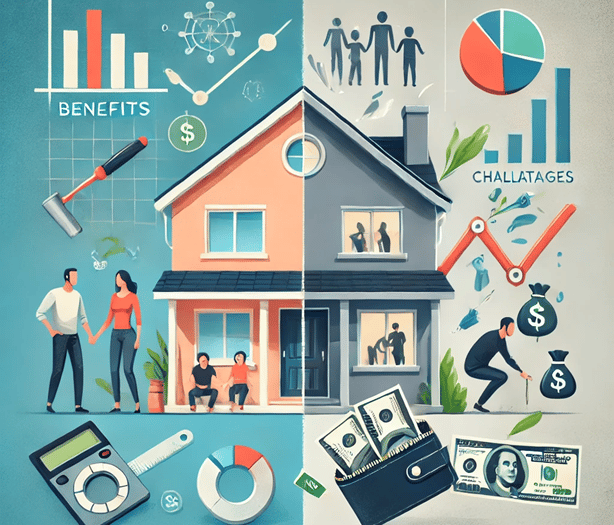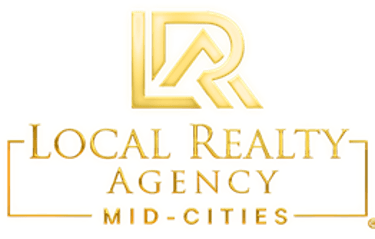Advantages and Disadvantages of Buying a Home: A Comprehensive Guide
Discover the pros and cons of buying a home, from long-term investment benefits and tax advantages to high upfront costs and market risks. Make an informed decision with our detailed guide.
John Baptiste
12/30/20243 min read
Advantages and Disadvantages of Buying a Home
Buying a home is a significant milestone and investment in many people's lives. While homeownership offers stability and potential financial benefits, it also comes with responsibilities and risks. Understanding the pros and cons of buying a home is crucial to making an informed decision.
Advantages of Buying a Home
1. Long-Term Investment
Purchasing a home is often considered a stable investment. Real estate generally appreciates over time, enabling homeowners to build wealth through equity. Additionally, owning property provides a hedge against inflation.
2. Stability and Security
Owning a home brings a sense of permanence and belonging. It’s ideal for individuals or families looking to settle down in a specific location for the long term.
3. Freedom to Personalize
Unlike renting, homeowners can renovate or decorate their property as they please. Personalizing a home enhances comfort and can potentially increase the property’s market value.
4. Tax Benefits
Homeownership often comes with tax advantages. For instance, mortgage interest and property taxes may be tax-deductible, which can significantly lower taxable income.
5. Fixed Monthly Payments
A fixed-rate mortgage ensures consistent monthly payments, protecting homeowners from rental market fluctuations and providing financial predictability.
6. Equity Building
Making mortgage payments contributes to equity, which is the ownership value in the home. Equity can be leveraged for loans or as a financial safety net during emergencies.
7. Legacy and Inheritance
A home is a tangible asset that can be passed down to future generations, contributing to generational wealth and security.
Disadvantages of Buying a Home
1. High Upfront Costs
Buying a home requires significant upfront investment, including a down payment, closing costs, and fees for inspections and appraisals. This can be a financial burden for many.
2. Maintenance Responsibilities
Homeownership comes with ongoing maintenance and repair responsibilities. From plumbing issues to roof replacements, these expenses can add up unexpectedly.
3. Lack of Flexibility
Unlike renting, owning a home ties you to a location. Selling a property is a time-consuming process that may not align with sudden lifestyle or career changes.
4. Market Risks
Property values can fluctuate based on economic and market conditions. Homeowners risk financial loss if the value of their home decreases significantly.
5. Mortgage Debt
A mortgage is a long-term financial commitment. Missing payments can lead to foreclosure and damage to credit scores.
6. Property Taxes and Insurance
Homeowners must budget for property taxes and insurance premiums, which often increase over time. These costs can strain monthly budgets.
7. Reduced Liquidity
Real estate is not a liquid asset. Converting a home into cash requires selling the property, which can take months and involve additional costs like agent fees.
Factors to Consider When Deciding
Financial Stability
Evaluate your ability to manage mortgage payments, taxes, and maintenance expenses.
Lifestyle Needs
Consider whether your current life stage aligns with the stability of homeownership or the flexibility of renting.
Market Conditions
Research local housing market trends and economic factors that may influence property values.
Time Horizon
Homeownership is generally better for individuals planning to stay in one location for an extended period.
Conclusion
Buying a home is a complex decision with both advantages and disadvantages. While it offers financial stability, equity building, and a sense of security, it also demands significant financial and personal commitments. Carefully evaluating your financial situation, lifestyle goals, and market conditions can help determine if buying a home is the right choice for you.
FAQs
1. What are the main financial benefits of owning a home?
The primary financial benefits include building equity, tax deductions on mortgage interest, and potential property value appreciation.
2. How much should I save before buying a home?
Experts recommend saving at least 20% of the home’s purchase price for a down payment, plus additional funds for closing costs and emergency repairs.
3. What are the risks of buying a home in an unstable market?
In an unstable market, home values may decline, leading to potential financial loss if you need to sell your property.
4. Is renting better than buying?
Renting offers flexibility and lower upfront costs, while buying provides stability and long-term financial benefits. The decision depends on individual circumstances.
5. Can I buy a home with less than 20% down payment?
Yes, many loan programs allow for lower down payments, but they may require private mortgage insurance (PMI), increasing your monthly costs.


Contact Us
Office: 803 Forest Ridge Dr Suite 207 | Bedford, TX 76022
Phone: (817) 415-0310
Email: agent@localrealtymidcities.com
Local Realty Agency Mid-Cities 2026 | Privacy Policy
